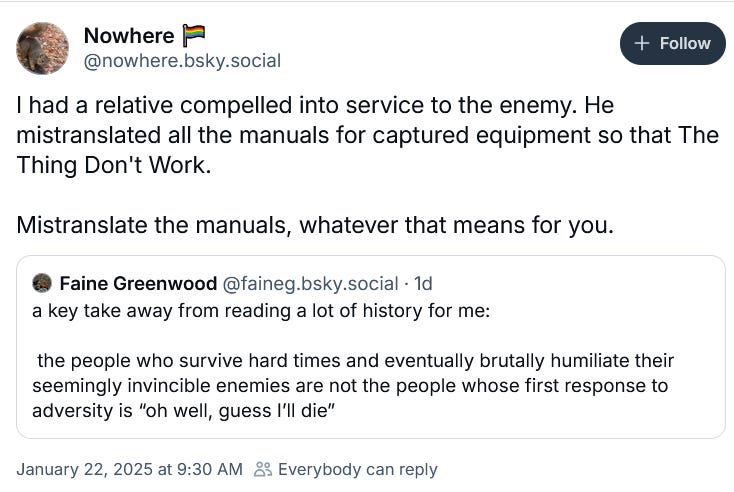everyday forms of mass defiance
practice noncompliance for the day when it matters.
In his essay “Two Cheers For Anarchism,” Political scientist James Scott writes,
“One day you will be called on to break a big law in the name of justice and rationality. Everything will depend on it. You have to be ready. How are you going to prepare for that day when it really matters?”
He explains that “you have to stay ‘in shape’ so that when the big day comes you will be ready.”
How do you stay in shape? Anarchist calisthenics:
“Every day or so break some trivial law that makes no sense, even if it’s only jaywalking. Use your own head to judge whether a law is just or reasonable. That way, you’ll keep trim; and when the big day comes, you’ll be ready.”
His essay is summarized extremely well by this tiktok:

 Tiktok failed to load.
Tiktok failed to load.Enable 3rd party cookies or use another browser
Anarchist calisthenics is a metaphor for small everyday acts of defiance that prepare individuals to resist oppressive authority when the need arises.
“I have in mind,” Scott says, “such acts as foot-dragging, poaching, pilfering, dissimulation, sabotage, desertion, absenteeism, squatting, and flight.”
Some modern terms we have for these include: quiet quitting and malicious compliance. We have phrases like “We pretend to work and they pretend to pay us” and “boss makes a dollar, I make a dime; that’s why I [x] on company time.”
Noncompliance leads to telling ICE to “gargle [his] balls.”
Noncompliance leads to mistranslating manuals:
Noncompliance leads to sabotaging bullets in armament factories.
Noncompliance leads to more of us surviving this.
But how will you be able to do these acts of noncompliance — which require bravery, stealth, and familiarity with keeping secrets — if you don’t practice?
There’s a scene from The West Wing that changed the way I interacted with authority forever. Oliver Babish tells C.J. Cregg: “I’d like you to get out of the habit of doing that.” “Doing what?” she asks. “Answering more than was asked,” he says.
One of the most important parts of these anarchist calisthenics is to teach you that you won’t get caught, and that there will be no repercussions — as long as you don’t snitch on yourself. James Scott writes,
The perpetrators rarely seek to call attention to themselves; their safety lies in their invisibility. The officials, for their part, are reluctant to call attention to rising levels of disobedience; to do so would risk encouraging others and call attention to their fragile moral sway. The result is an oddly complicitous silence that all but expunges such forms of insubordination from the historical record.
[…] It’s worth noticing something particular about these acts: they are virtually all anonymous, they do not shout their name. In fact, their unobtrusiveness contributed to their effectiveness. Desertion is quite different from an open mutiny that directly challenges military commanders. It makes no public claims, it issues no manifestos; it is exit rather than voice. And yet, once the extent of desertion becomes known, it constrains the ambitions of commanders, who know they may not be able to count on their conscripts.
One of the most important lessons you can learn is to learn silence in the face of authority. Don’t snitch, don’t comply, don’t volunteer information. Get out of the habit of answering more than was asked. You don’t owe those people anything.
Why do these small acts of disobedience matter? Well…
Scott explains,
Acts of disobedience are of interest to us when they are exemplary, and especially when, as examples, they set off a chain reaction, prompting others to emulate them. Then we are in the presence less of an individual act of cowardice or conscience—perhaps both—than of a social phenomenon that can have massive political effects. Multiplied many thousandfold, such petty acts of refusal may, in the end, make an utter shambles of the plans dreamed up by generals and heads of state. Such petty acts of insubordination typically make no headlines. But just as millions of anthozoan polyps create, willy-nilly, a coral reef, so do thousands upon thousands of acts of insubordination and evasion create an economic or political barrier reef of their own.
The only way to be ready is to get ready.
How are you going to prepare for the day when it really matters?
Break a stupid rule today, for me. Never tell anyone. Do it tomorrow, too. Practice your calisthenics. The day is coming sooner than you think.



